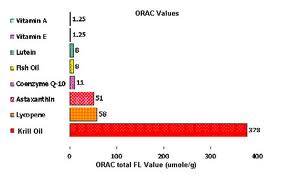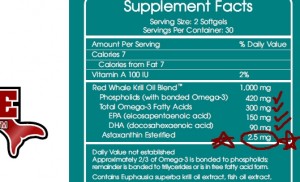
…Because They Can’t Be
Absorbed By Your Body
…Astaxanthin is a fat-soluble nutrient. Which means it must have fats to break down and be absorbed by the body.
This is a double-edged sword – on the one hand, this is what enables astaxanthin to be absorbed and deliver all the benefits everyone is talking about.
However – on the other hand, it also means that unless certain fats are present when you digest astaxanthin, most of it will be wasted.
Why Aren’t All Astaxanthin
Supplements The Same?
If you’re like most of the people who land here, this is not your first astaxanthin website. You’ve already done some research, and you’ve been hit with several different sales pitches. You know what astaxanthin can do for you. You’re fairly sure it’s what you want.
But deciding which supplement to get is the kicker. We get that.
So we have two goals for this page:
1, We want to tell you about the best way to get astaxanthin, and the supplement we think is the most effective. But…
2, We also want to help you understand what makes the difference. So that even if you do choose another product, at least you’ll know what you’re actually getting. You’ll make an informed choice, based on real science.
We’re the Rag-Tag Research Geeks™, and that’s kinda what we do around here. And not to toot our own horn, but our research has even been featured in the media a time or two.
How To Keep Your Astaxanthin Supplement
From Flushing Down The Toilet
It seems simple enough: a fat soluble nutrient needs the presence of fats. Of course you want healthy fats, so some manufacturers will include flax seed oil or other Omega-3 sources in their astaxanthin supplements – they’re hoping to boost absorption.
But not all Omega-3’s are created equal. Some are in the form of triglycerides, and some are in the form of phospholipids.
Our cell walls are made of phospholipids. So the body is able to use them much more efficiently than triglycerides.
Fortunately, there is a very simple way to get naturally occurring astaxanthin with phospholipids, and therefore use more of what you take: Krill Oil.
Why Krill Oil Gives You More Bang
For Your Astaxanthin Supplement Buck
There are 3 very good reasons why getting your astaxanthin from Krill Oil is better than getting it from an isolated astaxanthin supplement:
 The phospholipid structure of the Omega-3s in krill oil bind to the astaxanthin to make it much more bioavailable to your body. You absorb more, and get more benefit from a lower dose.
The phospholipid structure of the Omega-3s in krill oil bind to the astaxanthin to make it much more bioavailable to your body. You absorb more, and get more benefit from a lower dose.- The astaxanthin in krill oil has been naturally esterified by the krill. So while it still comes from the microalgae that produced it, it’s been naturally converted to a more usable form for your body.
- Krill oil delivers a host of other benefits you won’t get from an isolated astaxanthin supplement.
But There Is.. WAS.. A Catch…
Most astaxanthin proponents will tell you not to rely on krill oil to get your astaxanthin as there usually isn’t enough in a krill oil supplement to matter. And most of the time this is true. But not anymore.
We found Red W____ Krill Oil™.. the highest levels of astaxanthin combined with the healthy fats neccessary for absorption means more benefits and less waste..
Red W____ Krill Oil™ combines the best of both worlds:
- The highest grade krill oil available delivers the most concentrated phospholipid, Omega-3, DHA and EPA content for all the benefits of top quality krill oil
- Astaxanthin binds with those phospholipids to give you all the power of a higher-dose isolated astaxanthin supplement with less waste
The Rag-Tag Research Geeks Recommend:
Red W____ Krill Oil™
This is one of our favorite products in all the supplement world! Red W____ Krill Oil™ has the highest concentrations of everything that makes Krill Oil effective, plus extra astaxanthin. It is the most effective krill oil supplement (and the best way to get astaxanthin) we can find!
As you can see on the label above, Red W____™ contains:
- 420 MG Phospholipids (That’s 42%!)
- 300 MG Omega-3’s with 150 MG EPA/ 90 MG DHA
- A full 2.5 MG astaxanthin
Has This Information Helped You?
Before we tell you a few places where you can get Red W____™, we’d just like to say that if this information has been helpful to you, you can get a lot more by becoming a member. In addition to cool benefits, membership helps make sure this site stays up and running to help as many people as possible.
So as we said we wholeheartedly recommend you choose Red W____ Krill Oil™. But since we don’t sell anything on this site, the question is…
??? Where To Get It ???
More and more retailers carry Red W____ Krill Oil™ every day. You can find several of them by searching Google, of we’ve listed a few of our favorites below.
1. StillSmilin.com — relative newcomer, they are attracting customers with very low trial prices and automatic monthly shipments. This is a perfect service for people serious about staying healthy, long term, and that’s exactly what we are all about, so we wholeheartedly support what they are building!
Get Red W____ Krill Oil™ from StillSmilin.com
2. Amazon.com — perhaps the largest retailer online. Is there anything they don’t sell?
Get Red W____ Krill Oil™ from Amazon.com
3. aProvenProduct — Sells all the products we recommend and has the best customer service anywhere.
Get Red W____ Krill Oil™ from aProvenProduct.com



Is it possible to take a seperate astaxanthin supplement WITH a Krill oil supplement containing phosphoslipid at the same time and still get the same or near the same benefits? I order my astaxanthin through Puritans Pride as a completely seperate pill.
Hi Grahambot. If you truly prefer taking your astaxanthin separate, I don’t see a problem with this. But to get the most from your astaxanthin, you will definitely want to make sure you’re taking a krill oil supplement with AT LEAST 40% phospholipids. The phospholipid structure of the Omega-3s in krill oil will bind to the astaxanthin, making it much more bioavailable to your body. It will be absorbed better, and you’ll get more benefit from a much lower dose of astaxanthin than the 5MG and 10MG Puritan’s Pride doses.
You can stick with Puritan’s Pride’s astaxanthin and whatever krill oil supplement you’re interested in. But just to let you know, for comparison sake, Red Whale Krill Oil is a pretty good deal as it has extra phospholipids, 2.5 MG of astaxanthin, and 150 MG EPA/ 90 MG DHA of omega-3s.
Another advantage to taking krill oil that already has astaxanthin in it, rather than taking them separately, is the astaxanthin has already been naturally esterified by the krill. So while it still comes from the microalgae that produced it, it’s been naturally converted to a more usable form for your body.
Geek5, what is the definition of “esterified”?
I’m not “Geek 5”, but I can help.
To get your definition, we have to break down both parts of the word. The important part of the word esterified being “ester” (meaning: An organic compound formed when an acid and an alcohol combine and release water.) Esters formed from carboxylic acids are the most common, and have the general formula RCOOR, where R and R are organic radicals. Esters formed from simple hydrocarbon groups are colorless, volatile liquids with pleasant aromas and create the fragrances and flavors of many flowers and fruits. They are also used as food flavorings. Larger esters, formed from long-chain carboxylic acids, commonly occur as animal and vegetable fats, oils, and waxes. I hope that helps!
I am a little confused on another post below between bld2104 and Geek 1. bld2104 asks, “Specifically, what do you think of Mercola’s product for Astaxanthin?” The answer from Geek 1 was, “Since there are no phospholipids to boost absorption we’d recommend a higher dose than Dr. Mercola’s product, although other than that it seems like an OK alternative.”
If phospholipds are needed for absorption then if a vegan or vegetarian were to use Dr Mercola’s product exactly how much more would you recommend? Also would the lack of absorption be like throwing your money away because you would get so little astaxanthin and have to take huge amounts of the product?
Dr Mercola lists his product as containing Omega 3 ALA (from Perilla Seed Oil) 325 mg. He states, “I specifically chose alpha-linolenic acid (ALA) because it is an omega-3 fatty acid that can act as an excellent ‘carrier’ for astaxanthin… to help you maximize absorption.*
He also says on his web site, “Due to the fact astaxanthin is best absorbed when taken with a ‘fatty’ meal (lipid-soluble), look for a formula that contains some sort of natural oil or fatty acid that will help maximize your absorption. Without this additional ingredient, your absorption could be less than optimal.”
But from your research that is not the right kind of fat for absorption, is that correct? Taking it with a fatty meal is also not correct, is that right?
I am still a little confused, hope you can help.
Hi Susie. Astaxanthin is a fat-soluble nutrient, so it is better broken down and absorbed by the body when it is digested with fats. Without the presence of these fats, the astaxanthin that you ingest will be wasted. The reason Geek1 mentioned the absence of phospholipids in Dr. Mercola’s product, is because phospholipids bind to astaxanthin, making it much more bioavailable to your body. However, since you’re vegan, your sources for phospholipids are limited as you can’t ingest krill oil or common phospholipid food sources like DHA eggs or caviar.
Dr. Mercola’s product is giving you essential fatty acids in the form of ALA, which may be your best bet for a non-animal derived omega-3 to help with astaxanthin absorption. After digestion, the body converts ALA into docosahexaenoic acid (DHA) and eicosapentaenoic acid (EPA), the two most essential omega-3 fats for cell structure. The downside is that this conversion process is slow. The human body converts ALA to DHA at a rate of 100 to 1. So it is fair to equate the 325 mg ALA to 3.25 mg DHA. Not that a krill supplement is an option for you, but we usually lool for about 90MG of DHA for effectiveness. Someone on a vegan diet may need around 200-300MG every two or three days, unless they are over 60 years old, at which point they will want 200-300MG daily.
Good food sources are walnuts, soy, canola oil, hempseed oil, flaxseed oil, and chia seed oil. To make sure your Omega-6 to Omega-3 balance doesn’t go off kilter due to your diet restrictions, try all you can to avoid preparing food with Omega-6-rich oils like soy, corn, sunflower, safflower, and sesame oil. Instead opt to cook with olive oil, peanut oil, canola oil (low heat/short period of time), and avocado oil.
I will keep an eye out for a quality vegan astaxanthin/fatty-acid product for you but haven’t found one in preliminary research. In the meantime, you can check out the Ala Green Omega-3 supplement link that mamaset posted, although some of their claims seem very exaggerated, I couldn’t find an easily accessible product label, and I don’t particularly like the mixing of other ingredients/herbs in the formula.
How about a crushed astaxanthin capsule mixed with raw hemp hearts? The high omega is there. Or mixing astaxanthin powder with the aformentioned ignoble hemp hearts? I’ve just come from ebay with a look at 100 grams of astaxanthin priced $43! I’m just crazy about the Primal Greens energy drink, but like most of that kind product, It doesn’t have much astaxanthin in it, although it does have the Omega.
I meant Optimal Greens in my first post.
Howdy. That sounds like a great mix, the astaxanthin and the omega fatty acids will really make a difference.
The Optimal Greens you mentioned seem to be more balanced than most green drinks and there are more buying options available so you could probably find a good price on it if you check around online.
Can you please recommend a vegan friendly brand of Astaxanthin that is made from Haematococcus algae that also has healthy fats necessary for absorption? I found some Astaxanthin made H/A but it does not state if it has or what kind of healthy fat needed for absorption. Relying on your knowledge, please help.
Regarding the comment above, could you suggest the next best option for vegetarians/vegans? I am vegetarian so I won’t take Krill Oil but want to take Astaxanthin. Specifically, what do you think of Mercola’s product for Astaxanthin?
Thanks.
The next best option would be a product that comes from haematococcus algae. Since there are no phospholipids to boost absorption we’d recommend a higher dose than Dr. Mercola’s product, although other than that it seems like an OK alternative.
Hello,
I read your suggestion about krill oil; that it’s the best catalysis to transport Astaxanthin across the cell membrane. However, you all presume that the ‘one size fits all’ mentality is the norm, and it’s not! What about groups like the Jews or the Seventh-day Adventist that has a religious conviction about what goes into ones’ belly? And what about Vegans and vegetarians? Krill oil may be all you say, but can you put a price on ‘peace of mind’ that comes from following ones convictions? It’s ‘priceless’ last I checked!
Hi beckncall7. You know what, you are quite right! Us “Geeks”, answers come from a science perspective. With that being said, even science opinions are different, research is diverse, and people hold different opinions and follow a variety of belief systems. Here at aPY, we don’t come from a “One size fits all mentality”, and I am sincerely sorry that you feel we do. What we do is give you our advice and information on a product and its effectiveness based on scientific research. If you hold a different opinion, or chose not to take the supplement, or advice, that’s completely fine. We sincerely believe the choices you make and what you chose to do with the information given is always up to you.”